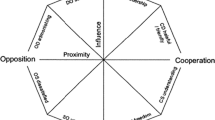Abstract
This paper explores ways in which service-learning programs can enhance ethics education in engineering. Service-learning programs combine volunteer work and academic study. The National Society for Professional Engineers (NSPE) and American Society for Civil Engineers (ASCE) codes of ethics explicitly encourage engineers to seek opportunities, beyond their work-related responsibilities, to serve their communities. Examples of how this can be encouraged as a part of the educational experiences of engineering students are explored.
Calvin: How good do you have to be to qualify as good? I haven’t killed anybody. See, that’s good, right? I haven’t committed any felonics. I didn’t start any wars. I don’t practice cannibalism. Wouldn’t you say I should get lots of presents?
Hobbes: But maybe good is more than the absence of bad. Calvin and Hobbes
Similar content being viewed by others
References
Calvin and Hobbes, by Bill Watterson, December 23, 1990.
Accreditation Board for Engineering and Technology, Fifty-third Annual Report, 1985, 98.
See http://www.abet.org/EAC/cach2000.html.
Tsang, E. (1998) Why Service Learning? And How to Integrate it Into a Course in Engineering, in: Ritter-Smith, K. and Saltmarsh, J. eds., When Community Enters the Equation: Enhancing Science, Mathematics and Engineering Education Through Service-Learning, Campus Compact, Brown University, Providence RI.
Decker, R. (1998) Professional Activism: Building from Service-Learning, Reconnecting Community, Campus and Alumni through Acts of Service, in: Ritter-Smith, K. and Saltmarsh, J. eds., When Community Enters the Equation: Enhancing Science, Mathematics and Engineering Education Through Service-Learning, Campus Compact, Brown University, Providence RI.
NSPE Code (revised July, 1996).
Pritchard, M. S. (1998) Professional Responsibility: Focusing on the Exemplary, Science and Engineering Ethics 4: 215–233.
ASCE Code (1996)
Stanton, T. (1989) Integrating Public Service With Academic Study, Campus Compact, Providence, RI.
Wylie, D. (1993) AVIT Team Helps Disabled Children, Currents (Texas A & University: Electrical Engineering, Summer), p. 6.
Research Agenda for Combining Service and Learning in the 1990s, National Society for Internships and Experiential Education, Raleigh, NC, 1991, p. 7.
Website for CESG: http://k2.cwru.edu/cse/cesg/staff/goals.html.
CESG brochure.
CESG Strategic Plan Draft: 1997–2000, pp. 1–2.
“Goals and Objectives” at CESG website: http://k2.cwru.edu/cse/cesg/staff/goals.html.
Ritter-Smith, K. and Saltmarsh, J. (1998) When Community Enters the Equation, Enhancing Science, Mathematics and Engineering Education Through Service-Learning, Campus Compact, Brown University, Providence RI.
Cuny, F.C. (1983) Disasters and Development, ed: Abrams, S. for Oxfam America, Oxford University Press, New York.
Cuny, F.C. and Hill, R.B. (1999) Famine, Conflict, and Response, Kumarian Press, West Hartford, CT.
Moral Leaders section of the Center for Ethics in Science in Engineering: http://Onlineethics.com.
Kuhn, S. (1998) Engineering Students Encounter Social Aspects of Production, Science and Engineering Ethics 4: 457–472.
Schlossberger, E. (1997) The Responsibility of Engineers, Appropriate Technology, and Lesser Developed Nations, Science and Engineering Ethics 3: 317–326.
Author information
Authors and Affiliations
Corresponding author
Rights and permissions
About this article
Cite this article
Pritchard, M.S. Service-learning and engineering ethics. SCI ENG ETHICS 6, 413–422 (2000). https://doi.org/10.1007/s11948-000-0041-z
Received:
Revised:
Accepted:
Issue Date:
DOI: https://doi.org/10.1007/s11948-000-0041-z



